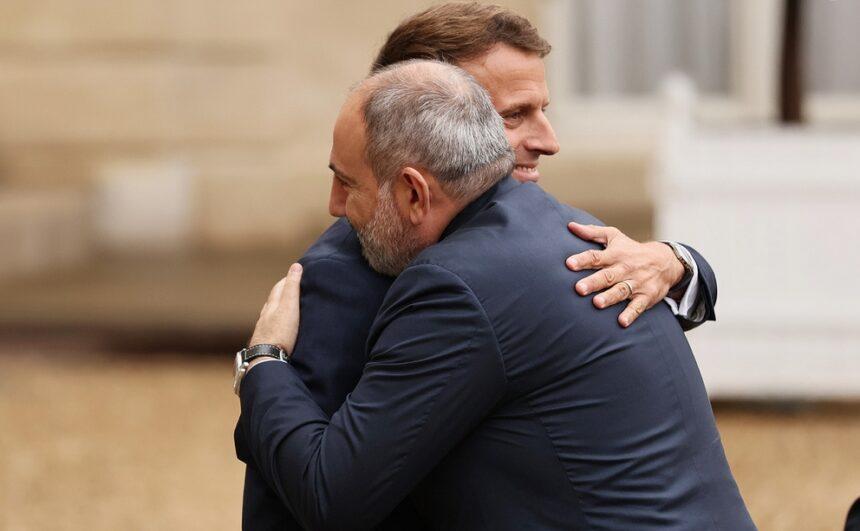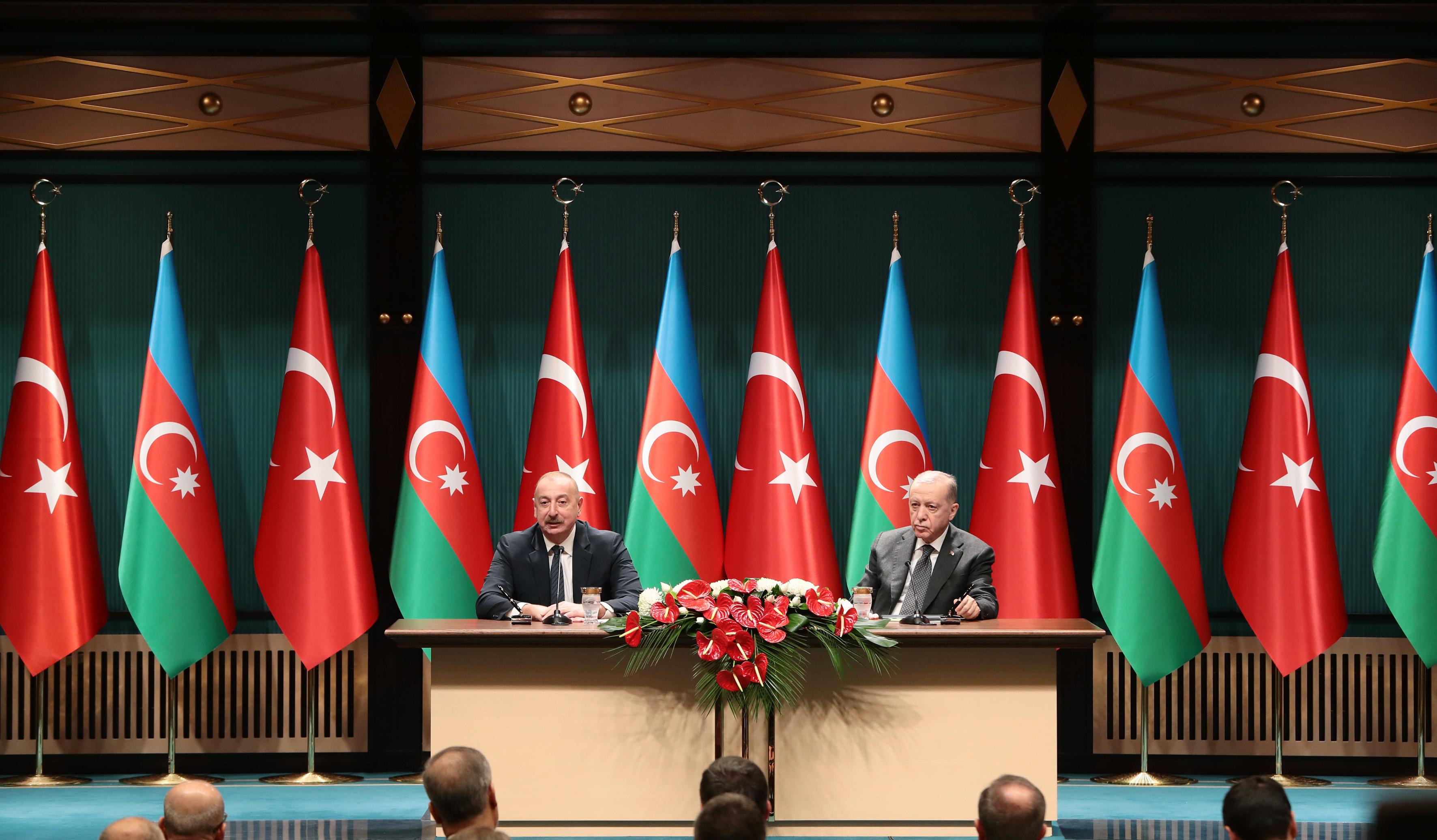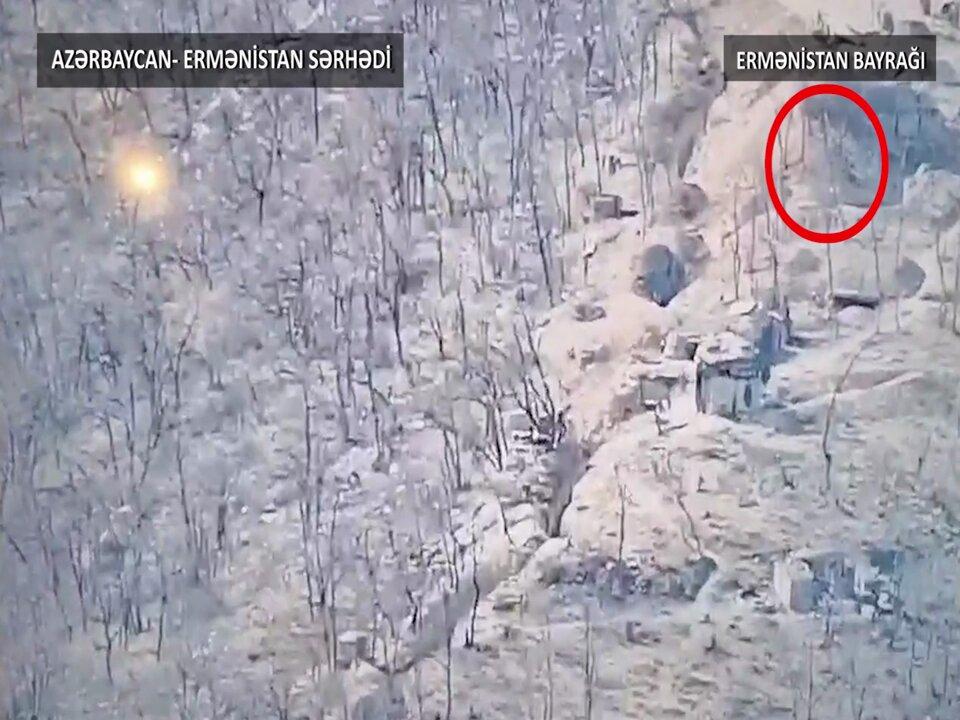Macron commits to bolstering military co-op with Armenia following Pashinyan visit Paris is arming Yerevan
President Emmanuel Macron has reaffirmed the ongoing defence collaboration between France and the South Caucasus’ firebrand nation of Armenia.
Rolling out the red carpet for Armenian Prime Minister Nikol Pashinyan at the Élysée Palace, Macron consented to the provision of military equipment to Armenia, pledging that Paris would persist in its responsible conduct without triggering any escalation.

His remarks came hot on the heels of Azerbaijani President Ilham Aliyev’s resounding victory in the snap presidential elections, spectacular performance at the Munich Security Conference, and first post-election visit to Ankara where the two leaders renewed their loyalty to bonds of friendship.
In the grip of his own problems at home and with colonies, the French leader did not fail yet again to meet Armenians’ expectations and again threw his weight behind Yerevan, adding that France would steadfastly back the enhancement of ties between the European Union (EU) and Armenia. Crediting the EU mission in Armenia (EUMA) for dubious activities, he vowed to be conducive to the mission to further foster stability, provide the global community with impartial insights, and safeguard vulnerable groups residing in military conflict regions.

In response, Prime Minister Nikol Pashinyan expressed his gratitude to Macron for bolstering Armenia's fortitude, emphasizing the importance of the Armenian-French alliance in the defence sector, alleging that it is crucial to maintain peace and stability in the South Caucasus region. Further, Pashinyan renewed Armenia's intention to enhance its defence prowess, vowing that this should not instigate worry among neighbouring countries, alleging Yerevan’s respect for their territorial sovereignty.
Pashinyan clarified, “Our sole objective is to establish equilibrium in the region, safeguard Armenia's authorized, sovereign territory that has international recognition, defend its borders, maintain its territorial sovereignty, and strengthen our nation's resilience.”
On February 22, Armenian news outlets, quoting the French newspaper Le Figaro, revealed that French Minister of Armed Forces Sebastien Lecornu plans to visit Yerevan on February 22-23. Reports also indicated that Armenia received a consignment of defence equipment from France, and this followed the significant arms agreements that Paris and Yerevan signed in October.
In the meantime, Armenia is forging stronger military alliances with France, given the escalating tensions in its longstanding association with Russia. Armenia contends that it is compelled to broaden its foreign and security strategies due to the failure of the Moscow-dominated military coalition (CSTO) to fulfil its security obligations.
Armenian Security Council Secretary Armen Grigoryan perceives the CSTO, of which Armenia is a member, as being inadequate. In response to the criticism of Russian officials regarding Armenia's "indecision", Grigoryan clarified, "Armenia is not wavering in its stance, rather, it is expanding in its foreign policy and security scope. This is being done openly. The expansion encompasses not only Western nations but also China and several other geopolitical directions. Given that the security framework, in which Armenia participates, failed to perform adequately in 2020-21 and is generally ineffective, Armenia is in the process of seeking alternative security assurances. Efforts in this regard are ongoing. I see no issue with this, Grigoryan added.
Baku’s peace calls instil trepidation in Yerevan
Arms and military hardware procured by Armenia from nations such as India and France significantly lag behind contemporary quality benchmarks and these acquisitions would be insufficient for Yerevan in case it plots conflicts in the future.
Azerbaijan's formidable military strength has indisputably demonstrated its alignment with contemporary demands, and the Baku government has further fortified it by acquiring the latest military technology. The February 12, 2024, border incitement initiated by Armenia against Azerbaijan re-escalated the military and political tensions in the South Caucasus to a critical level.
This recent act of aggression by Armenia has severely undermined the peace process in the region and even Azerbaijan’s critics were compelled to admit detrimental consequences of the incident at meetings with leaders of the two South Caucasus nations. Consequently, the likelihood of war has once again surfaced as the most immediate threat in the region. The entire onus for the current volatile situation lies with Armenia due to its instigation of the armed conflict.

Despite the apparent oddity, Armenia's official stance, particularly that of Yerevan, does not show any inclination toward taking ownership of its actions. The Pashinyan government is seemingly on a path to rationalize its military instigations indirectly, putting the blame squarely on Azerbaijan. Recent declarations and conduct from official Yerevan provide ample evidence to support this conclusion.
A clear understanding of this stance can be achieved by observing Armenian Prime Minister Nikol Pashinyan's response to recent happenings. He stated that the Armenian defence minister issued directives to respect the ceasefire and to avoid falling into the trap of provocations. He further elaborated, stating that any breaches of the directive would be subject to investigation and subsequent repercussions. The Armenian prime minister’s claim that Azerbaijan retaliated forcefully, irrespective of the ongoing investigations, was minimal irresponsibility and failure to learn a lesson from Azerbaijan’s remarks that no crime would remain unpunished.
Prime Minister Nikol Pashinyan apparently fails to comprehend a basic fact - the directives issued by Armenian ministers are applicable only within Armenian territory. Yet, the legitimacy of decisions made by Pashinyan's government within Armenia itself raises substantial scepticism. On the contrary, Azerbaijan does not need to await the outcomes, having witnessed the degree of fulfilment of the Armenian defence minister's directive.
The only significant military reality for Baku is the assault launched on Azerbaijani territory from a foreign nation, necessitating a fitting response, a right Azerbaijan exercised. Now, Yerevan can continue to scrutinize the military provocation instigated by Armenia and its unavoidable repercussions at its leisure.
Evidently, Prime Minister Nikol Pashinyan is attempting to frame the situation exclusively from an Armenian standpoint. He disregards the fact that Armenia was the initiator of the conflict and characterizes Azerbaijan's rightful retaliation to the military provocation as an act of aggression towards Armenia. It seems as if the prime minister is under the impression that Armenia has the liberty to provoke Azerbaijan militarily without any consequences. However, he misinterprets Azerbaijan's response to Armenia's act of war as a policy of military aggression.

Nikol Pashinyan either fails to comprehend or deliberately overlooks the fact that Azerbaijan's response is intended to preserve the stability and security on borders. Baku is confident that any lack of immediate and severe response to Armenia's military provocations could potentially encourage the adversary to perpetuate armed conflict along the border region. Official Baku is resolute in its decision to deny Armenia the opportunity to develop such provocative tendencies.
The prime minister alleges that Azerbaijan insists on a policy of "give me what I want through negotiations, otherwise, I will seize it through conflict". The Armenian leader neglects to remember that eight Azerbaijani villages continue to languish under Armenian occupation. The Armenian government must absolutely return these villages to their rightful owner - Azerbaijan.
Baku advocates for the resolution of such issues through diplomatic discussions. However, if the Armenian government complicates the negotiation process and attempts to dodge returning the occupied territories under various pretences, it should brace itself for potential military repercussions. Rightly so, official Baku has no intentions of allowing Azerbaijani territories to remain under Armenian control. These developments highlight that official Yerevan is steadfast in its traditionally uncooperative stance.
The Pashinyan administration is banking on the backing of the USA, the EU, and France towards Armenia. Yerevan is under the impression that the international allies of Armenia will manage to shield it from the impending military clash with Azerbaijan. However, this is a perilous gamble for Armenia, as the US, the EU, and France may not be inclined, or even able, to rally to Armenia's defence.








